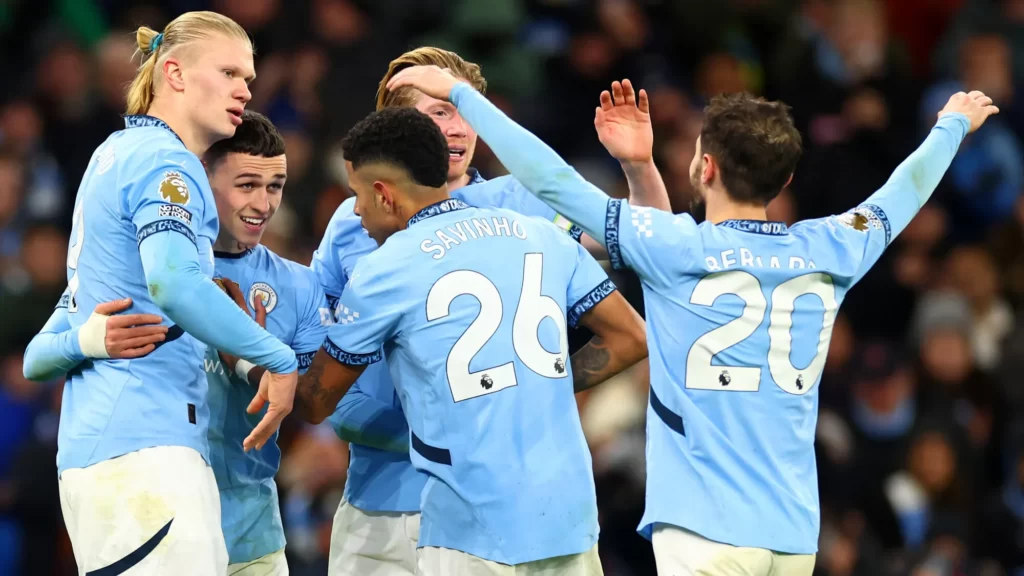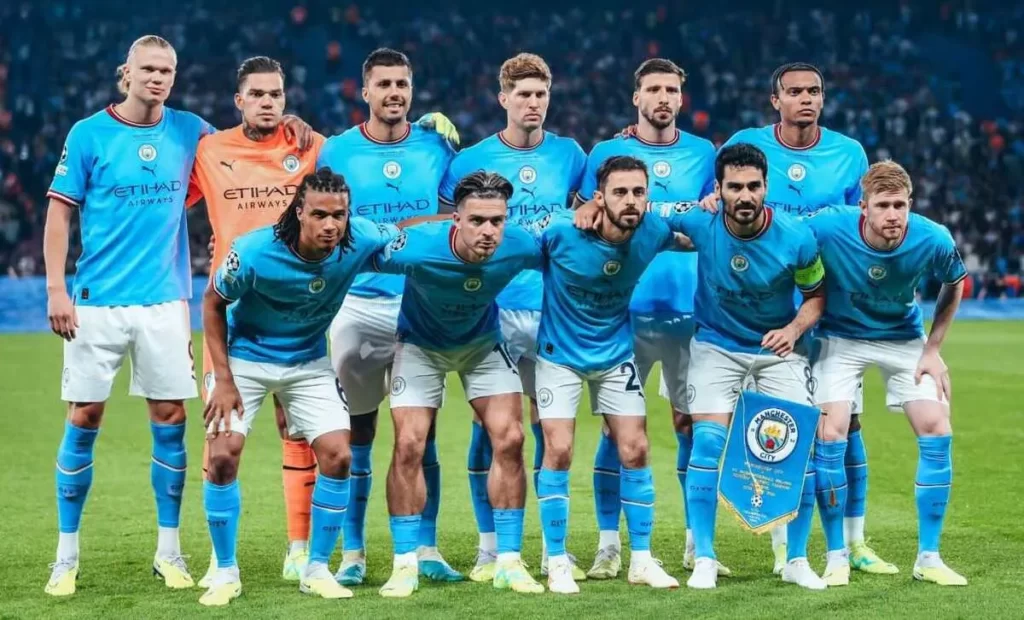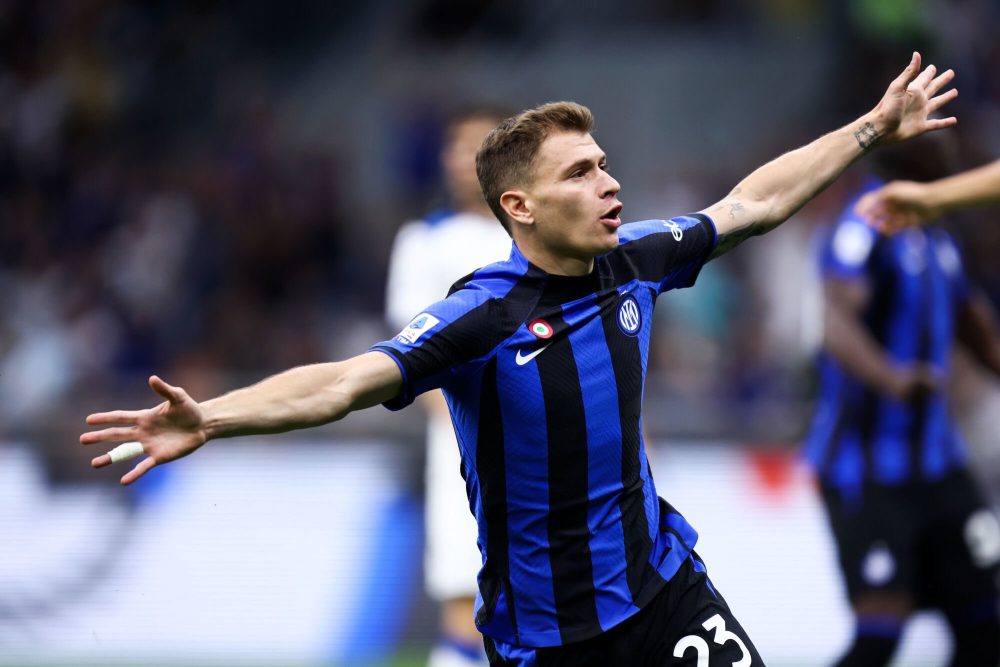City was born in the dusty back streets of Manchester, where football culture was more than just a sport – it was life, energy and a way of expressing yourself. Founded in 1880, Manchester City Football Club has travelled a long and thorny road from a simple English team to an international brand admired by millions. Much has changed since then, from unsightly stands in old stadiums to luxurious arenas that have hosted some of the most colourful matches. It is the perseverance and love of football that has made the team one of the most successful in the world.
The history of the club: from the first steps to worldwide recognition
The history of Manchester City begins at the end of the 19th century, when the club was founded under the name St Mark’s. The first major victory came in 1904, when the team won the FA Cup, and this success was a harbinger of many successes to come. But the road was not always paved with roses: In the 1930s, the club was in crisis and many thought it would not survive. It was only thanks to the loyal fans and the resilient coaches that the team was able to survive these difficult times.

In 1998, Manchester City was almost relegated from the professional league. The team was on the brink of the second division, which was a real challenge for everyone involved and the fans. Coach Joe Royle, known for his determination, took up the challenge. He introduced an intensive training regime that included morning and evening sessions to improve the players’ physical fitness and build team spirit.
The enormous support of the fans played its part: Over 30,000 fans came to every game, even during the toughest moments, which boosted the morale of the athletes. One particularly memorable moment was the final play-off game against Gillingham in 1999, which Manchester City won in a dramatic penalty shoot-out. This moment was not only a symbol of recovery, but also a testament to the unbroken spirit of the team and the devotion of the fans. This period was the starting point for a new growth that eventually took the team to the top of world football.
Achievements and records
Manchester City Club has an impressive collection of achievements that have made it one of football’s leading brands. One of the most significant events took place in the 2011-2012 season when the team won the Premier League and Sergio Agüero scored a famous goal in the final minutes of the game against Queens Park Rangers.
Manchester City’s 3 most important successes in recent years:
- Winning the Premier League in the 2017-2018 season with a record 100 points.
- Triumph in the English League Cup in 2020, which was proof of the team’s stability and strength.
- Reaching the Champions League final in 2021, underlining the team’s status in European football
Manchester City coach and squad: How the Champions League team was put together
 Manchester City’s managers have always played a key role in the club’s success. Roberto Mancini, who took over the team in 2009 and laid the foundations for future victories, has a special place among them. It was he who instilled discipline and a systematic approach to the team, which helped them win the Premier League three years later.
Manchester City’s managers have always played a key role in the club’s success. Roberto Mancini, who took over the team in 2009 and laid the foundations for future victories, has a special place among them. It was he who instilled discipline and a systematic approach to the team, which helped them win the Premier League three years later.
Roberto Mancini’s 3 most important contributions to Manchester City’s success:
- Implementing a strict training regime that ensured players were consistently fit.
- He brought in key players like David Silva and Yaya Toure, who became the backbone of the team.
- Creating a winning mentality that gave the team the momentum they needed to win their first Premier League title.
The next key link was Pep Guardiola, who arrived in 2016. Guardiola changed Manchester City’s style of play, making it more attacking and spectacular. Under his leadership, the team won the Premier League several times and set new quality standards in English football.
Composition: strength in diversity
The composition of Manchester City for the new season is surprising in its depth and diversity. The team has managed to strike a balance between experience and youth: Every player understands his role and is ready to contribute to the overall victory. Goalkeeper Ederson provides a solid defence of the goal, while Kevin de Bruyne is becoming a real conductor with the ball on the pitch.
Among the new talents, Phil Foden deserves special mention as he has developed into one of the key players. Foden symbolises the youthful face of Manchester City, its ability to look to the future and find talent that can strengthen the team. Such a squad makes the team one of the strongest in the world, capable of competing at any level.
Fans and culture: the foundation of success
Manchester City’s fans have always been an important part of the club. With their support, the team has experienced both triumphant moments and difficult times. In times when the team has struggled to survive, the fans have never lost faith and have continued to come to the stadiums to create an atmosphere that helps the players on the pitch.
One of the fans’ most colourful traditions is “Blue Moon”, a song that is played at every home game and binds all fans together as one. This culture of support is more than just a love of football, it is true loyalty and dedication.
Leadership that comes from effort and passion
 Manchester City’s leadership is not only the result of the professionalism of the coaches and the skill of the players, but also the tremendous passion that every member of the team brings to the job. This club doesn’t just win games – it inspires millions of people around the world with its commitment to excellence and unwavering belief in its own strengths.
Manchester City’s leadership is not only the result of the professionalism of the coaches and the skill of the players, but also the tremendous passion that every member of the team brings to the job. This club doesn’t just win games – it inspires millions of people around the world with its commitment to excellence and unwavering belief in its own strengths.

Every goal, every win is no accident, but the result of hard work and a strategic approach. Manchester City continues to lead the way on the world football stage, inspiring people to believe in their own strengths and to excel in all areas of life.
 en
en  de
de  ar
ar  es
es  nl
nl  hi
hi  fr
fr  it
it  pt
pt  el
el 









